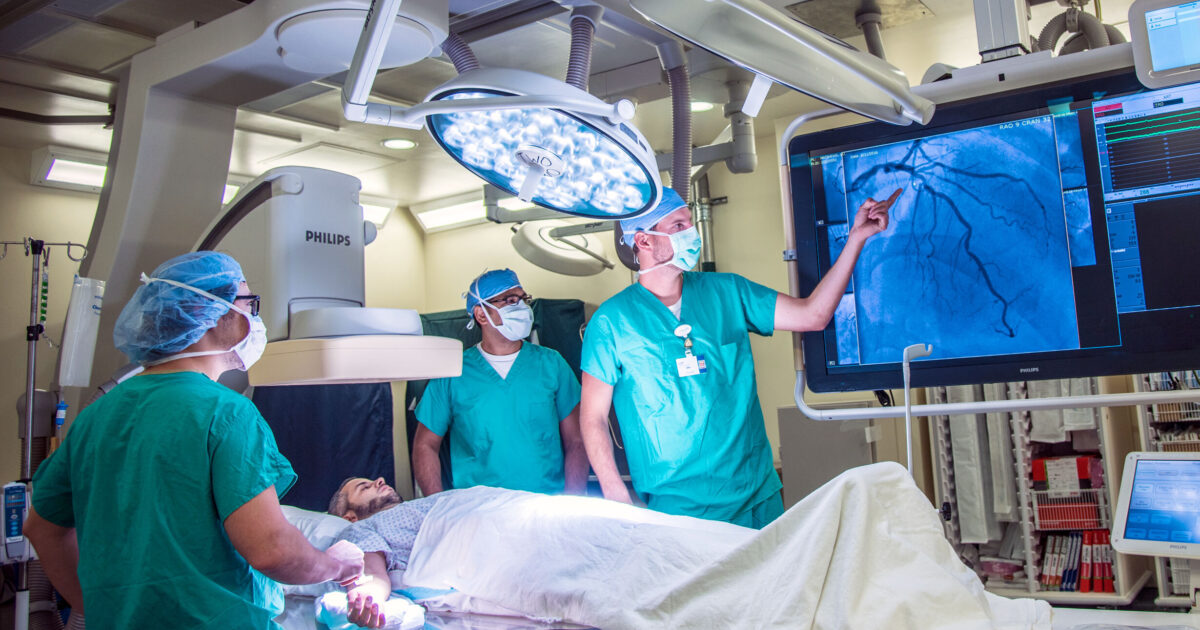Avoid heart disease with Cardiology care: A proactive approach
Avoid heart disease with Cardiology care: A proactive approach
Blog Article
Recognizing the Significance of Cardiology in Modern Healthcare Services
Cardiology plays an important duty in contemporary medical care, particularly as heart problem proceeds to be the leading source of death worldwide. Developments in diagnostics and therapy have transformed individual care, enabling earlier treatments and boosted end results. The shift towards preventative cardiology equips individuals to handle their health proactively. As technology remains to develop, the combination of innovative services may better redefine cardiology's effect on public wellness, triggering a better examination of arising patterns and their ramifications.
The Occurrence of Heart Problem and Its Influence on Public Wellness
Heart condition continues to be the leading cause of death around the world, its effect prolongs much past specific people to impact public health and wellness systems and economic situations. The high occurrence of heart illness positions a significant strain on healthcare resources, requiring boosted funding for rehab, prevention, and therapy programs. Public health and wellness efforts must resolve danger variables such as weight problems, smoking cigarettes, and inactive lifestyles, which contribute greatly to the rising occurrence of heart conditions.Moreover, the economic problem associated with cardiovascular disease is immense, incorporating not only straight clinical costs however likewise indirect costs connected to lost efficiency and early death. Neighborhoods encounter difficulties in managing these costs, usually causing variations in medical care accessibility and results. As the population ages and lifestyle-related risks remain to intensify, the urgency for reliable cardiology interventions ends up being extremely important. Attending to heart illness is not just an issue of individual health and wellness but also an essential public wellness priority.
Advancements in Heart Diagnostics and Imaging Techniques
Current advancements in heart diagnostics and imaging methods have transformed the field of cardiology, enhancing the capacity to keep track of and identify heart problem. Methods such as heart MRI, CT angiography, and echocardiography have become significantly sophisticated, supplying thorough photos of cardiac frameworks and features. These techniques permit the very early identification of problems like coronary artery condition, heart failure, and valvular disorders.Moreover, developments in non-invasive diagnostics, such as wearable innovation and remote monitoring devices, have actually empowered individuals and health care service providers. These devices help with real-time monitoring of heart rhythms and various other necessary indications, leading to timely interventions. In addition, synthetic knowledge is being integrated right into imaging analysis, boosting accuracy and effectiveness in medical diagnosis.
Technologies in Therapy Choices for Heart Issues
Current developments in cardiology have resulted in significant innovations in therapy options for heart problems. These include advanced surgical strategies that enhance step-by-step results and arising drugs that use brand-new opportunities for therapy. As the area advances, these advancements play an important role in improving person treatment and outcomes.
Advanced Surgical Techniques
Developments in medical strategies have actually changed the landscape of cardiology, offering new hope for individuals with heart conditions. Minimally invasive procedures, such as catheter-based treatments, have actually substantially reduced recovery times and medical facility remains. Strategies like robotic-assisted surgery improve accuracy, permitting doctors to browse complex physiological structures with higher precision. Advancements in imaging innovation assist in real-time visualization during procedures, boosting outcomes. Transcatheter aortic shutoff substitute (TAVR) exhibits a development in treating aortic stenosis, enabling shutoff replacement without open-heart surgery. In addition, hybrid techniques that combine catheter-based and medical approaches supply customized solutions for various cardiac concerns. These advanced surgical strategies not only improve individual safety yet also expand therapy choices, emphasizing the essential function of technology in modern-day cardiology practices.
Arising Therapies and medicines
As the landscape of cardiology remains to advance, arising drugs and therapies play a critical duty in boosting treatment alternatives for heart problems. Developments such as unique anticoagulants and advanced lipid-lowering agents have actually changed the management of cardiovascular conditions, significantly lowering client morbidity and mortality. In addition, the growth of gene therapies and regenerative medicine supplies encouraging avenues for dealing with conditions previously considered irreparable. Scientific tests are continuously revealing the efficiency of these therapies, pressing the borders of conventional treatments. In addition, the integration of electronic wellness modern technologies assists in tailored medicine, permitting tailored treatment strategies based upon genetic and way of life elements. Jointly, these innovations highlight the dynamic nature of cardiology, boosting patient end results and redefining criteria of treatment in contemporary health care.
The Duty of Preventive Cardiology in Patient Care
Preventive cardiology plays a crucial function in person care by concentrating on the recognition of threat elements that contribute to heart illness. Through way of life alteration techniques and very early detection techniques, doctor can properly reduce the incidence of cardio occasions - Cardiologist near me. This aggressive technique not only boosts person outcomes yet also promotes long-lasting health
Risk Aspect Recognition
While heart diseases remain a leading root cause of morbidity and death worldwide, efficient risk aspect recognition functions as a foundation of preventative cardiology. Recognizing threat variables such as high blood pressure, household, hyperlipidemia, and diabetic issues history is important for early intervention. Medical care specialists use various screening approaches to assess these aspects, enabling tailored precautionary steps. Furthermore, recognizing a person's way of life choices, such as cigarette smoking and physical lack of exercise, better educates threat evaluations. This extensive evaluation allows medical professionals to establish customized treatment plans focused on mitigating risks. By focusing on threat factor recognition, healthcare systems can improve person results and lower the total worry of cardiovascular diseases, eventually adding to improved public health and wellness strategies and source appropriation.
Way Of Life Modification Methods
A multitude of research studies highlights the crucial duty of lifestyle adjustment approaches in lowering heart disease danger. These strategies incorporate dietary modifications, increased physical activity, smoking cessation, and weight management. By adopting a heart-healthy diet rich in fruits, vegetables, whole grains, and lean proteins, individuals can lower cholesterol levels and high blood pressure. Routine physical task reinforces the heart and boosts general cardio wellness. Additionally, giving up smoking greatly reduces the danger of heart problem and boosts healing prices for those with status quo. Weight monitoring additionally adds to cardiovascular health and wellness by reducing various other danger elements such as diabetes and high blood pressure. Carrying out these way of living alters not only promotes specific wellness yet also works as a keystone of precautionary cardiology in individual treatment.
Very Early Discovery Techniques
Way of life alterations considerably add to decreasing heart disease dangers, yet they are most effective when coupled with very early detection techniques. Preventive cardiology highlights the relevance of recognizing potential heart issues before they intensify into major conditions. Methods such as blood pressure tracking, cholesterol screening, and progressed imaging innovations like echocardiograms play vital duties in examining cardio wellness. Biomarkers and genetic testing likewise boost the precision of early detection, permitting for tailored preventive techniques. Regular cardiac threat examinations empower healthcare service providers to step in proactively, possibly avoiding cardiovascular disease and strokes (Cardiology). By incorporating these early detection methods into routine care, individuals can take advantage of timely lifestyle treatments and targeted therapies, inevitably enhancing and enhancing outcomes quality of life
Integrating Modern Technology Into Cardiology Practices
As developments in technology remain to reshape different fields, the integration of cutting-edge devices and systems into cardiology methods has ended up being essential for enhancing client treatment and end results. Telemedicine platforms allow cardiologists to monitor people from another location, boosting access to care while reducing the burden on health care facilities. Wearable devices, such as smartwatches, allow continual heart rate surveillance, signaling both patients and physicians to prospective problems in real-time. In addition, man-made knowledge (AI) is being utilized to assess vast amounts of cardiac information, assisting in very early diagnosis and personalized therapy plans. Advanced imaging methods, consisting of 3D echocardiography, boost visualization of heart frameworks, causing a lot more precise interventions. Digital health records (EHRs) streamline person info administration, making certain that cardiologists have immediate accessibility to essential information. With each other, try this web-site these technical developments are changing cardiology, promoting aggressive monitoring and improved health results for individuals with cardio conditions.
The Relevance of Client Education And Learning and Involvement
Client education and learning and engagement play a crucial duty in the management of cardiovascular health and wellness. By outfitting patients with knowledge about their conditions, therapy options, and way of living modifications, doctor empower individuals to take an active duty in their care. This positive strategy can bring about enhanced adherence to suggested medicines, nutritional adjustments, and exercise regimens, eventually reducing the risk of complications.Engagement also fosters a strong patient-provider relationship, motivating open interaction and count on. When people feel informed and entailed, they are most likely to voice problems and ask inquiries, which can lead to better clinical results. In addition, academic sources, such as workshops or electronic systems, can improve understanding and promote self-management strategies. Generally, focusing on patient education and involvement is necessary for enhancing cardio health and wellness, improving lifestyle, and lowering healthcare expenses associated with cardio conditions.
Future Patterns in Cardiology and Their Possible Effect

Often Asked Questions
What Way Of Living Adjustments Can Minimize Heart Illness Risk?
The existing concern addresses lifestyle adjustments that can considerably decrease cardiovascular disease threat. Cardiologist near me. Embracing a balanced diet regimen, participating in regular physical task, maintaining a healthy and balanced weight, handling stress, and staying clear of tobacco can especially enhance cardio health and wellness
How Can I Identify Early Indicators of Heart Problems?
Identifying early indicators of heart problems entails monitoring signs such as chest discomfort, lack of breath, tiredness, and uneven heartbeat. Prompt recognition of these signs can motivate required clinical evaluation and intervention for far better outcomes.
What Are the Distinctions In Between Cardiologists and Cardiac Surgeons?
The distinctions between cardiologists and cardiac doctors depend on their functions; cardiologists largely diagnose and handle heart conditions via non-invasive methods, while cardiac specialists execute surgeries to remedy architectural heart issues. Each plays an important, distinctive duty.

Exactly how Typically Should I Get My Heart Wellness Checked?
The visit their website regularity of heart medical examination varies based upon private risk variables. Normally, adults should undertake assessments every one to 2 years, while those with existing problems may require even more frequent analyses as recommended by healthcare specialists.
What Role Does Genes Play in Heart Illness Threat?
Genetics greatly affects heart disease danger, with familial patterns suggesting inherited problems. Specific genes can incline individuals to high blood pressure, cholesterol issues, and various other cardiovascular issues, highlighting the importance of hereditary testing in assessing heart wellness. Heart disease continues to be the leading reason of fatality worldwide, its influence extends much past individual clients to influence public health systems and economic situations. Public health efforts have to address danger variables such as obesity, cigarette smoking, and less active lifestyles, which contribute considerably to the climbing incidence of heart conditions.Moreover, the economic problem linked with heart disease is immense, including not just straight clinical prices but also indirect costs connected to shed productivity and early mortality. Preventative cardiology plays a necessary role in individual treatment you can try here by concentrating on the recognition of threat factors that contribute to heart disease. Synthetic intelligence (AI) and maker discovering are boosting diagnostics and person monitoring, enabling early detection of heart diseases. The distinctions in between cardiologists and heart doctors exist in their duties; cardiologists largely detect and take care of heart problems with non-invasive techniques, while cardiac cosmetic surgeons carry out surgical procedures to correct architectural heart concerns.
Report this page